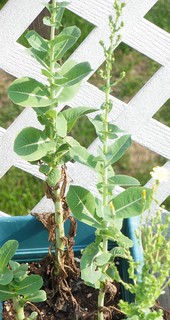 Bolting
Bolting
“Bolting is when agricultural and horticultural crops prematurely produce a flowering stem (or stems) before the crop is harvested, in a natural attempt to produce seeds[1] and hence reproduce. These flowering stems are usually vigorous extensions of existing leaf-bearing stems, and in order to produce them, a plant diverts resources away from producing the edible parts such as leaves or roots, resulting in a poor quality harvest from the grower’s point of view. Plants that have produced flowering stems in this way are said to have bolted. Crops inclined to bolt include lettuce, beetroot, brassicas, spinach, celery and onion.[1] — Wikipedia.org
Unfortunately, living here the San Fernando Valley of Los Angeles, I am very familiar with bolting in plants as our long periods of high heat can cause cold crops to bolt to seed almost immediately. Here we must grow out lettuce and kale in what other parts of the US would consider deep Winter — January through March. I often joke that we only get about 2 weeks of nice Spring weather before the Summer heat arrives and any of the last cold weather plants in the ground will quickly bolt. Even worse, you can’t really predict when the heat will arrive, so you play a bit of a gambling game with anything planted later in the season.
You can recognize bolting by flower stalks arising from plants you normally raise for leaves of root. With many plants, bolting takes energy from the formation of roots and leaves and, in the case of lettuce and other leaf crops, it can turn them very bitter and inedible. While you can recognize bolting, there is nothing you can do to halt the process as far as I know. You can only try to plant with the proper season for your area and hope that the weather cooperates. Of course, this is true with everything in gardening, isn’t it?
Photo of bolted lettuce
Photo used under Creative Commons from Filckr User paix120
More information on Bolting:
- Bolting on Wikipedia
- What Is Bolting: What It Means When A Plant Bolts from Gardening Know How
- Why Lettuce Bolts, and What You Can Do About It from Vegetable Gardener.com
- Soil pH
- Leaf Arrangement
- Nitrogen Fixaton
- Stoma
- Parasite/Parasitism
- Xeriscaping
- Deadhead/Deadheading
- Fungus
- Petal
- Fruit
- Cotyledon
- Epiphyte
- Humus
- Conifer
- Deciduous
- Hybrid/Hybridization
- Acclimatization/Acclimation
This Garden Vocabulary series seeks to introduce and explain to you — and in many cases, myself — words and terms associated with gardening. Please let me know if there are any terms you would like me to explore. You can leave your ideas in the comments section and we can learn together!
